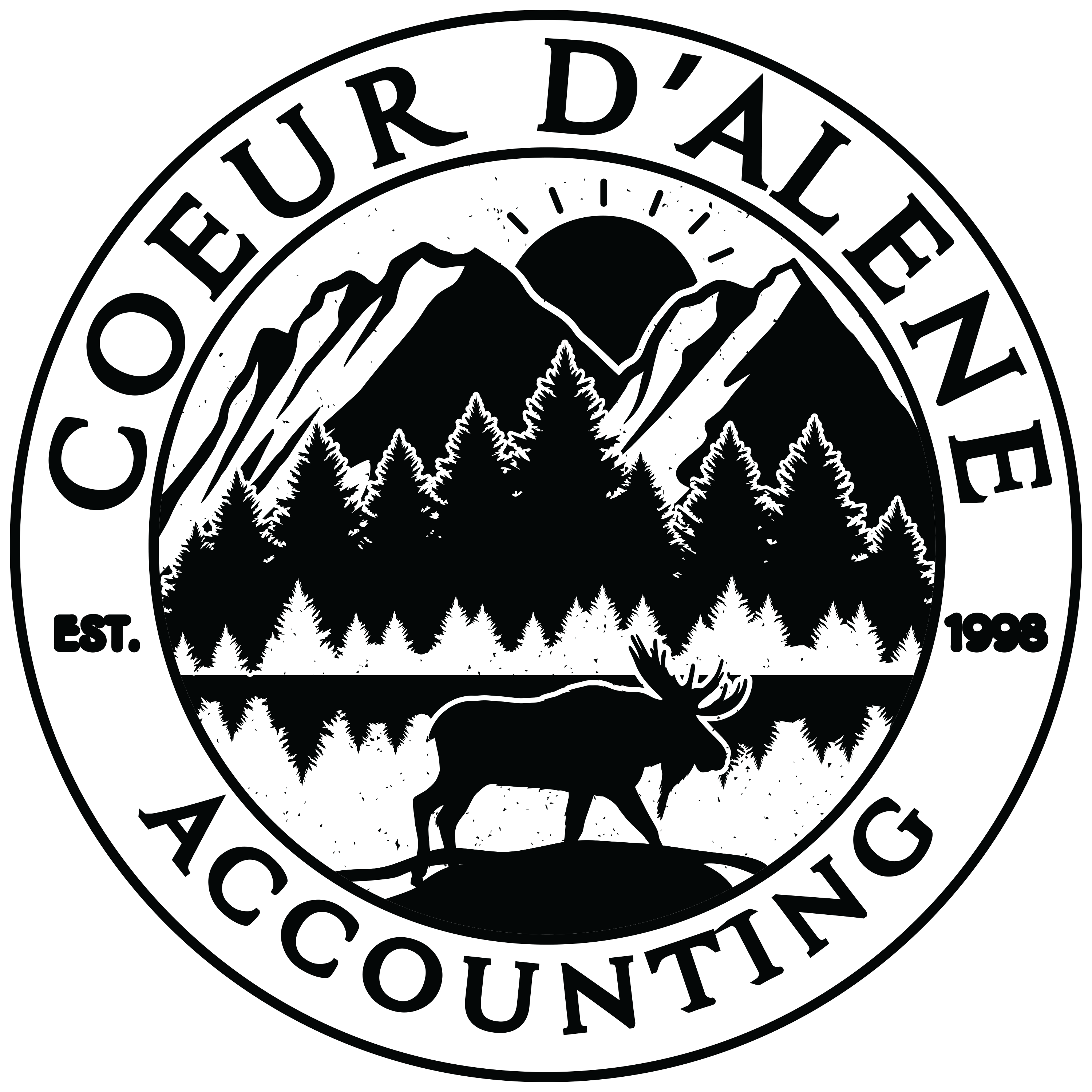by cdaaccounting | Jan 11, 2022 | Accounting 101, Business Entities, New Tax Law Changes, Tax Resolution
Has your Coeur d’ Alene S corporation been paying you compensation on Form 1099-MISC?
By having your CDA S corporation pay you on just a 1099, you have the following three issues:
- Your Idaho S corporation violates tax law because it fails to pay you W-2 wages for the services you performed for the corporation in Coeur d’ Alene.
- The IRS can reassign your S corporation’s 1099 payments as wages and hand the S corporation a hefty tax bill consisting of back payroll taxes, interest, and penalties.
- You are likely to have deductible expenses with the wrong entity. Coeur d’ Alene Tax law requires that the expense deduction belong to the entity that incurred the expenses and earned the related income.
If you pay yourself on both a 1099 and a W-2, you also have tax issues:
- You likely pay several thousand dollars more in Idaho self-employment tax than required.
- You muddy the water when it comes to Idaho business deductions. It may be very unclear whether you should deduct the expenses on Schedule C or on the S corporation return. This confusion can cause you to claim the expenses on the wrong tax returns and can enable the IRS to deny your valuable Idaho business deductions. Find a CDA Accountant or CDA CPA when dealing with these IRS Issues.

by cdaaccounting | Jan 5, 2022 | New Tax Law Changes

If you are wondering if you should hire full-time Idaho employee or use independent contractor, don’t make the mistake of thinking they are the same thing. Employees and Contractors are not alike in the state and federal governments eyes. If the State or IRS suspects that you are not classifying your workers correctly, they might audit you. As you should know by now, auditors are not your friends. Employment taxes are a major source of funding for both the state and government, so be sure you can prove your position.
Here is the State of Idaho & the IRS’s definition of an independent contractor:
“The general rule is that an individual is an independent contractor if the payer has the right to control or direct only the result of the work and not what will be done and how it will be done.”
Employee Versus Independent Contractor the Pros and Cons
- Employees will feel pride and status through the hierarchy of positions available.
- They want a paycheck that they can count on, so they will likely continue performing the job functions they are trained to do.
- Train them your way or it’s the highway. This is a great benefit if you are looking for an employee to provide very specific and skilled tasks.
- The hourly wage for a full-time employee is often much less, because they have job security. If you were to hire out for the same work with a freelancer, you can often expect to pay a bit more.
- You don’t need to scramble to find help when your workload increases. If you only rely on independent contractors and need urgent help, your favorite freelancer might be booked. Or it might cost you a lot more to hire last minute.
- You don’t have to wear all the hats of your business yourself. Instead you can delegate tasks permanently to others. This frees up your time to do the tasks best suited for you.
- You don’t need to continually train staff on how you like things done. Your employees know you and can do the work without the need for continual direction.
- If you want to take a vacation, you can be assured that someone is holding down the fort for you in your absence.
- Although it isn’t mandatory, most full-time employees expect benefits, like health care and vacation time.
- The hiring process can be intense and time consuming. If you are not great at hiring the right candidate to work with you or your current staff, this could be a source of frustration.
- You’ll need to pay their salaries on time, even if your business has a lull. In order to cover their paychecks, you’ll need to have a reserve of money in your bank account.
- You’ll have specific payroll paperwork that is legally required. In addition, you will need to withhold your employees’ taxes, social security and Medicare.
- You are responsible for your employees’ training and professional licensing requirements. These vary from state to state.
- You will be responsible for issues like theft, sexual harassment, overtime, holiday pay, bonuses, stock options, retirement accounts, vacation, health related leave, unemployment, work related injuries, vehicles etc.
- They get paid even if the job is not done or not done to standard.
Advantages of hiring an Idaho independent contractor:
- Small Coeur d’Alene business owners usually prefer to hire freelance workers for jobs when they need help. There are distinct advantages to sticking only to independent contractors:
- Although you usually pay more per job or per hour, you will most likely save money overall since you aren’t required to pay them any benefits and do not need to commit to a salary.
- Flexibility. When you work with an independent contractor and it isn’t a good match, you simply don’t hire them again. When you have an employee that doesn’t work out, you may need to fire them, which isn’t always easy.
- You can hire the right person for the task needed, contracting someone with a specialized service. They often have many years of experience, so you don’t need to train them.
- They are responsible for their own permits and professional licenses.
Disadvantages of hiring an Idaho independent contractor:
- You lose some control over how tasks are preformed, because you can’t closely monitor their work. You can guide them, but usually they aren’t on site and will run their business their way.
- They will not promote your brand, but their own. Their work is done under their business name, with their logos, etc.
- All copyrights will be owned by the independent contractor, unless you draft an agreement stating otherwise.
Understanding the difference between an independent contractor and a full-time employee will save you a lot of headaches in the future. Set up your Coeur d’Alene business with the type of workers that you need for long-term success.

by cdaaccounting | Nov 20, 2020 | Business Deductions, Business Entities

An Idaho corporation in Coeur d’Alene is a legal and separate entity from its owners. Because it’s a legal entity, it can be taxed, sued, enter into contracts and borrow money. These are general factors that any corporation receives.
- The owners are known as shareholders.
- The shareholders elect a board of directors to manage the Idaho company.
- The Idaho corporation has a life of its own and does not dissolve when ownership changes.
Below are the advantages and disadvantages of having an Idaho corporation in General:
Advantages
Disadvantages
- Cost of formation is higher
- Process of incorporation is formal and requires filing with the Secretary of State
- “C” Corporations in Sandpoint are often double taxed, first on profits then on dividends
- Board members can be held liable
- Requires formalities such as annual shareholders meetings, board meetings and keeping minutes.
- Failure to follow formalities can result in the loss of limited liability status
There are two types of corporations that are popular with small to mid-sized businesses.
Idaho “C” Corporations
An Idaho “C” corporation is the regular corporation that is taxed as a separate entity.
It requires these tax forms:
- Form 1120 or 1120-A: Idaho Corporation Income Tax Return
- Form 1120-W Estimated Tax for an Idaho Corporation
- Form 8109-B Deposit Coupon
- Form 4625 Depreciation
- Idaho Employment Tax Forms
- Other forms as needed for capital gains, sale of assets, alternative minimum tax, etc.
Idaho “S” Corporations
An Idaho “S” corporation in Post Falls allows the profits to be taxed like a partnership if certain qualifications are met. This means that profits and losses pass-through to the owner’s personal tax return.
-
- Form 1120S: Income Tax Return for S Corporation
- 1120S K-1: Shareholder’s Share of Income, Credit, Deductions
- Form 4625 Depreciation
- Employment Tax Forms
- Form 1040: Individual Income Tax Return
- Schedule E: Supplemental Income and Loss
- Schedule SE: Self-Employment Tax
- Form 1040-ES: Estimated Tax for Individuals
- Other forms as needed for capital gains, sale of assets, alternative minimum tax, etc.

by cdaaccounting | Nov 14, 2020 | Business Deductions, Business Entities

Once you’ve formulated your Coeur d’Alene Idaho business idea and know where you’ll obtain the money to fund your new startup, the next step is following our instructions for starting your business right the first time!
You have 4 choices when selecting a legal structure:
- Idaho Sole Proprietorship (form a Sole Proprietorship Now)
- Idaho Partnership (form a Partnership now)
- Idaho Limited Liability Company (LLC) (form an LLC now)
- Idaho Corporation or S-Corporation (form a corporation now)
Open the Company Bank Account
Select an Idaho bank and open the Idaho company bank account.
Contact the bank before opening the account to see what their specific requirements are to open a business checking account; some banks’ requirements are relatively simple, whereas some banks’ requirements are extremely complex.
Lease an Coeur d’Alene Idaho Office, Warehouse or Retail Space (if not home-based)
Depending on your type of business (retail, office, or warehouse), arrange for office space to be leased. Contacting a commercial Idaho realtor in your area can be helpful. Also, make sure to arrange for utilities and office furniture.
Depending on the type of Coeur d’Alene Idaho business you are in, you may need a Federal license or permit.
Most Hayden Idaho businesses do NOT require a Federal license or permit. However, if you are engaged in one of the following activities, you should contact the responsible Federal agency to determine the requirements for doing business:
- Investment advising
- Drug manufacturing
- Preparation of meat products
- Broadcasting
- Ground transportation
- Selling alcohol, tobacco or firearms
- Employment
Idaho State Licenses and permits
Some occupations and professions require a State license or permit. Laws vary from State to State. However, if you are engaged in one of the following professions, you should contact the responsible state agency to determine the requirements for your business:
- building contractors
- banks
- insurance carriers
- physicians
- appraisers
- accountants
- barbers
- real estate agents
- auctioneers
- private investigators
- private security guards
- funeral directors
- bill collectors
- cosmetologists
CDA Idaho State Licenses and Permits based on products sold.
Some state licensing requirements are based on the product sold. Contact your Idaho state licensing authorities to determine the licensing requirements of your business. For example, most states require special licenses to sell:
- liquor
- lottery tickets
- gasoline
- firearms
Most people engaged in the types of business that require a special State License or Permit are already aware of the requirements (i.e., an accountant is familiar with the licensing requirements for accountants).
Idaho Sales Tax Permit
If your company sells physical products within the state where it does business, you may have to collect and pay sales tax. This is usually accomplished by obtaining a State Seller’s Permit or Resale permit.
Idaho Business License
Most Cities or Counties require you to obtain a business license, even if you operate a home-based business. This is a license granting the company the authority to do business in that city/county.
Hire Employees (if applicable)
If you intend to hire yourself or others as a full or part-time employee of your company, then you may have to register with the appropriate State Agencies or obtain Workers Compensation Insurance or Unemployment Insurance (or both).
Set up an Accounting and Record-Keeping System
Setup your Accounting and Record-keeping system and learn about the taxes your new company is responsible for paying.
Company documents generally are required to be kept for 3 years, including a list of all owners and addresses, copies of all formation documents, financial statements, annual reports, amendments, or changes to the company. All Coeur d’Alene Tax Returns and Corporate Filings should be kept for at least 3 years.
Obtain Business Insurance in Coeur d’Alene
There are many types of insurance for businesses, but they are usually packaged as “General Business Insurance” or a “Business Owner’s Policy.” This can cover everything from product liability to company vehicles. A decent policy can run as little as $300/year and offers an extra level of protection.
Systematize and Organize
Prepare the business as if someone needed to take it over and run it for you. This means having a method to process orders, pay bills, pay employees, pay taxes, maintain your permits, etc. Basically, try to make the operational aspect of the business as automated and efficient as possible so you can concentrate on growing your business.
Develop an Idaho Business Identity
Order Idaho business cards, letterhead, and promotional materials for your Idaho business. A professionally created logo can make your business look professional and established.
Get the Word Out (Marketing)
Now that you’ve set up your Hayden company for success, you need to get the word out. Create a marketing plan for your products and services that targets your ideal customer.






Recent Comments